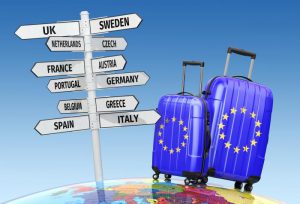by Robert Babirad *
I Introduction
The unexpected cancellation of a long awaited, pre-paid vacation is nothing to joke about. Naturally, if this happens and particularly during these turbulent times, the next question is how does one obtain a refund? Secondly, under what conditions is this even possible and especially given the current global pandemic? In November 2015, Directive 2015/2302/EU on Package Travel and Linked Travel was enacted. In light of the recent Coronavirus pandemic, guidance was again recently issued on current interpretations of this Directive and particularly with regard to how it will impact today’s travelers within the European Union.
II The Package Travel Directive
The Package Travel Directive aims to enhance the European Union’s internal and single market performance. This is expected to occur through attaining, to the highest degree possible, a “uniform” and “high” degree of protection for EU consumers with regard to those contracts executed between both merchants and travelers and “relating to package travel and linked travel arrangements. The Directive aids in the “approximating” of the various laws pertaining to packaged travel across the EU’s Member States, as well as to particular aspects of their respective regulations, laws and those provisions that govern the administration of this area.
Harmonisation in consumer protection through legal approximation across the EU is the overarching objective of this Directive.
III Cancellations and Refunds
Throughout the European Union, the governments of the Member States have been and continue to be, enacting measures, which have the intended objective of reducing the continued proliferation of the COVID-19 virus. One example is the introduction of the tier system in the UK. A system of three tiers has been implemented in order to limit an increase in the infection rate. These three tiers range from Tier One at “Medium Alert” to Tier 3, which is classified as a “Very High Alert” area. These labels are based upon where the infection rate is the greatest and contain varying levels of restrictions. An example is that of not being permitted to “socialise in a group” outside publicly with more than six people with whom you regularly reside or whom are not included within your regular “support bubble. These actions have additionally extended beyond border controls and internal, national restrictions, to the overall limiting and restricting of travel both within the EU and from abroad. Travel is regulated on a Member State basis throughout the EU. As a result, the measures that have been enacted in the fight against COVID vary widely based on the country that is implementing them. In other words, each country within the EU is implementing their own restrictions on where and with how many people you may socialize, testing requirements for the virus, where a mask is required and what an individual has to do if they want to travel to another location within the same country or abroad. At the EU level, it is the Directive on Package Travel and Linked Travel Arrangements that provides overall guidance to those impacted by unexpected cancellations of pre-booked packaged holidays. This Directive acts as a unified means of providing consumer protection despite the new restrictions and limitations being introduced by the Member States individually at the present time.
Article 12(2) of the Package Travel Directive states that prior to the start or execution of a purchased travel package, the traveler may terminate the contract and receive a full refund, as well as not be responsible for incurring any termination fees, if certain conditions are met. These conditions are namely “unavoidable and extraordinary circumstances occurring at the place of destination or its immediate vicinity,” and which are “significantly affecting the performance of the package,” or those which “significantly affect the carriage of passengers to the destination. The concept of that which “significantly” impacts the “performance of the package” is somewhat ambiguous and seemingly open to varying interpretations. The definition of significance remains unclear.
However, trips may be cancelled without any penalty to the organiser, where that entity is unable to execute the contract between the person booking the trip and the entity offering the package, and where these “unavoidable” and “extraordinary circumstances” exist. Similar protections exist on the consumer side as well.
IV Undue Delay
It is of interest to note that the Directive also requires that travelers who booked the package be notified promptly and without “undue delay” and prior to “the start of the package” if the organiser cancels the trip. The Directive does not clarify the interpretation of “undue delay” in the notification to the consumer. Therefore, the scenario is possible where the seller of the travel package already has knowledge of restrictions or limitations that have been or are about to be imposed by a national government, because of the Corona Virus. Perhaps, in not wanting to lose their profits, the merchant holds off on informing the consumer, with the hope that the restrictions will soon be lifted or invalidated and the package will not need to be cancelled. How long would constitute “undue delay” in informing the consumer in a scenario such as this? Unfortunately, the Directive fails to provide meaningful guidance to the consumer in this regard.
V Unavoidable and Extraordinary Circumstances
Article 12(2) of the Package Travel Directive permits travelers to be free of any penalty when cancelling a package trip as well, where the condition of “unavoidable and extraordinary circumstances” is present “at the place of destination or its immediate vicinity. The guidance which has recently been provided in light of the Coronavirus pandemic suggests that these circumstances entail a situation in which the traveler faces that which is beyond their control, and the results of those same circumstances were unable to be prevented by the consumer. This is in spite of taking of all “reasonable measures. The question is then raised as to what “reasonable measures” does the traveler need to take in order to be free of cancellation penalties for their package trip where there are “unavoidable and extraordinary circumstances” present? It seems obvious that in most cases, there would be nothing that the traveler would be able to do, where, for example, the virus is present in a Member State and travel is otherwise blocked. However, what situation would require “reasonable measures” to be taken by the consumer and what would those entail for purposes of meeting the criteria under this aspect of the Directive?
The information provided is helpful in that it states that COVID-19, another disease, or some other substantial health risk at the intended place of travel in the booking, would satisfy the criteria of constituting situations which are “extraordinary” and “unavoidable. On this, the Directive and the guidance recently provided is clear. In other words, if the virus is present and travel is being blocked by national authorities upon your arrival in another EU nation, there is nothing more that you can do as a traveler. This would be a situation considered “extraordinary” and “unavoidable” and there are no further “reasonable measures” in this regard that need to be taken by you.
Additionally, a traveler can employ the use of a national warning related to their travel, as a possibly effective strategy for demonstrating that there has been a circumstance, which is “extraordinary” and “unavoidable” and would justify them or the seller of the package in cancelling the contract, because of the impact on the actual trip’s execution. In other words, a national travel warning could be enough to constitute the “extraordinary” and “unavoidable” criteria necessary for fulfilment of the Directive and obtaining a full refund.
The guidance provided does also state that if the package travel contract cannot be executed, because of the authorities in a Member State prohibiting a certain type of movement or travel, this indeed would meet the criteria of circumstances, which are otherwise considered “extraordinary” and “unavoidable. Limitations enacted by an official authoritative body in a Member State relating to your trip, such as an attraction being closed, are also in all likelihood, qualifying measures that enable a package travel purchase to be effectively cancelled by the operator or the traveler.
VI Significantly Affecting the Package’s Performance
However, there is room for discretion and ambiguity in determining whether the circumstances actually constitute having an impact on the execution of the travel package and to the degree that a court would consider these to be “significant” enough for purposes of the Directive. There is a definite lack of clarity in this regard, and the Directive has in all likelihood been left purposefully vague and ambiguous here in order to allow each national court to make an assessment and interpretation that is specific to the circumstances. However, although seemingly done intentionally, this wording still leaves a certain degree of confusion on the traveler’s behalf.
Interestingly enough, fear is also not enough for a refund. If a traveler feels a sense of fear toward going to a destination in their package travel arrangement, this will not be adequate enough for a traveler to cancel their package and receive a full refund.[i] Instead, there must be a determination based on reasonableness in the context of potential life and health risks with regard to the decision as to whether travel to the place(s) in the contract would merit cancellation and entitle the traveler to a refund. If this situation is found to exist, the traveler or the purveyor of the package retains the right to cancel.
After the contract is cancelled, there will also be a period of fourteen days in which the traveler may receive a refund for their package travel purchase.
Vouchers for taking the trip at a later date may also be issued to travelers in lieu of a refund. However, there is also a lack of clarity here with regard to the possibility of a refund for a voucher that is not used or cannot be used within the time allotted. In all likelihood, the voucher itself would be issued under a separate contract with its own terms, conditions and refund policy and therefore not pose a problem under the Directive. This does not appear to be a cause of concern to the prospective traveler, but there is little guidance regarding vouchers otherwise given in this regard.
It is advised though that travelers should be open to accepting that their packaged tours are postponed until sometime in the future, because of the “strains on liquidity of tour operators,” which has resulted in them being burdened with claims for reimbursement and “missing new bookings. Travelers are encouraged to consider the possibility of accepting these vouchers or “credit note(s),” as long as the possibility remains of a full refund if the voucher is not ultimately used. The universal “uncertainty” surrounding travel arrangements is acknowledged and vouchers are offered as a potential option with the final possibility of a refund if needed by the traveler.
VII Traveler Assistance
The operator of a booked tour is required to provide travelers with assistance if they encounter blocks while on their trip and outside of their own respective Member State. This is particularly relevant given the rapidity of the changing situation regarding restrictions, quarantine and other limitations being imposed on a day to day basis under the current global pandemic. Health service information, as well as information regarding consular and help from regional authorities must be provided by the operator of the tour, to a traveler encountering challenges on their trip.
If a traveler is unable to return from their packaged tour, because of circumstances which are “unavoidable” and “extraordinary,” the operator of the tour has additional responsibilities. They must pay for the stranded traveler’s accommodation for up to three nights where the traveler’s transport back home was included in the pre-purchased travel package’s cost.
If the authorities in a locale that one travels to require the traveler to go under quarantine, and as a result, that individual does not make their flight back home, there are options. The national rules of the respective Member State in question, with regard to the quarantine, may enable the traveler to make a claim for repatriation and greater accommodation costs.
VIII Conclusion
The recent guidance is helpful regarding when a traveler with a pre-booked package trip may seek a full refund under EU law. This is especially useful in light of the current global pandemic. However, there are still vagaries that remain leaving a degree of uncertainty as to whether a consumer is eligible for a full refund of their trip from a vendor with regard to EU law. This is particularly true with regard to “unavoidable and extraordinary circumstances” under the Directive, as well as with regard to the consumer’s responsibility to take preventative measures, which are considered reasonable. Additionally, a travel package’s performance being “significantly” impacted remains open to varying interpretations. Finally, the “undue delay” responsibility on the part of the vendor of the package emerges as clear and uncertain with regard to consumer protection and their respective rights under the Directive. In summary, there are positive aspects of the Package Travel Directive and its unified approach across the Member States, particularly with regard to the current Coronavirus pandemic. However, there are aspects under the Directive that even with the current guidance, which has been provided, remain uncertain and vague for consumes of travel packages within the European Union.
* Robert Babirad holds a Masters in European Union Law from King’s College London and is the author of an upcoming, non-fiction travel memoir titled: In-Transit Passenger: Making the Journey Matter coming out in the Spring of 2021.






